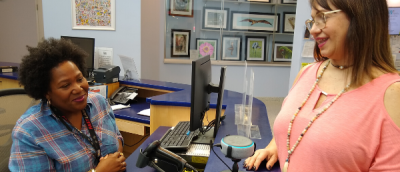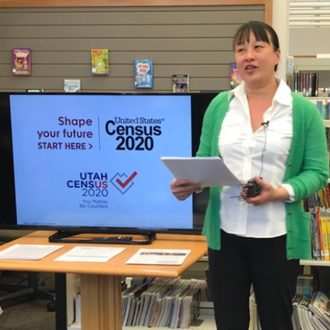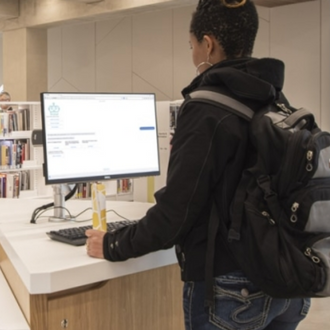Broward County Library Welcomes Newcomers with Voice-Assisted Technology

by Robert Anstett, Coordinator of Digital Initiatives and Vonda Bryant, Learning Services Coordinator, Broward County Library
Broward County Library tackles the question: How can staff assist customers when they do not share a common language?
Project Welcome is Broward County Library’s grant-funded initiative that welcomes and guides newcomers/immigrants as they learn the English language and adjust to life in Broward County, Fla.
Broward County Library acts as an entry point for newcomers who are attempting to transition into their new communities. To make the transition as easy and pleasant as possible, we created Project Welcome, a technology-driven, two-part initiative. Part 1 (Engaging) welcomes and involves newcomers and their families. Part 2 (Transitioning) offers a series of programs and services, including the expansion of our current English and Citizenship classes, along with a “Welcome Ambassador” program. An essential element of Project Welcome was the creative use of voice-assisted technology to bridge language barriers and enable staff to serve this population.
Project Welcome focuses on Haitian Creole, Portuguese and Spanish-speaking populations. Our objective is to inform these newcomers about the important resources offered by the library and to support them in literacy, economic prosperity and a sense of belonging. One unique way we could accomplish this was by offering the research skills of library professionals for guidance about agencies, services and opportunities.
Newcomers are an important component of the Library’s customer base. Broward County has the fifth largest growth in immigrant populations in Florida. Among immigrant groups, Broward County has the fastest-growing Hispanic population in the state, followed by one of the largest Haitian populations in the nation and a large Brazilian population. Foreign-born individuals account for 91% of Broward County’s English Language Learners (ELL). Speakers of Haitian Creole, Portuguese and Spanish make up the largest group of ELLs in Broward County and face the greatest challenges to success. Approximately 31% of Broward residents speak one of these three languages.
Project Welcome serves as a perfect starting point for newcomers. The library already offers English classes in 20+ libraries, citizenship classes in 15 branches and e-access everywhere to Rosetta Stone, a popular online language-learning resource. We wanted to reach out even further to include newcomers who were not using the library because they could not navigate their way without any knowledge of English.
Staff Engagement with Customers Who Do Not Share a Common Language
We started with Google Translate on tablets, familiarizing the staff through video training that showed how other libraries and customers were already using the program. Ten tablets with Google Translate were distributed as a test. The number would grow as the library enthusiastically purchased and repurposed existing tablets for use with Project Welcome.
Translation equipment for use with documents or to provide information to customers through a webcam was included in the Project Welcome grant. However, acquiring the equipment would require a long purchasing process, so we explored different voice assistants like Google Assistant and Alexa as options.
Our final choice became the Amazon Echo Dots, running on the Alexa for Business platform, funded by the Library Services and Technology Act (LSTA).
The affordability of the Echo devices allowed us to expand our model from only a few branches to every public service desk. However, with 100 desks to cover, creating 100 separate Amazon accounts to handle each one would be a logistical problem along with privacy concerns for our customers. Our solution was to use the Alexa for Business version platform for the software. This program offers a dashboard to control as many devices as needed, with a fee-per-device charge. We decided that the chance to expand our program would be worth the subscription cost, which was absorbed by our IT budget.
Under the Alexa for Business model, we are able to control what each device can do, such as choose what skills are accessible and what information is collected. We also have better privacy settings to protect the personally identifiable information of our customers. To add an extra layer of security, we added a secure private Wi-Fi network to each branch for the devices to run on without any interference to the public Wi-Fi.
Installation of the devices went smoothly with the tools that the Alexa for Business platform provides, taking only three days to put in place at our 36 participating branches. We taught an Introduction to Voice Assistants class to staff to allay privacy fears and explain how the program worked. The devices proved to be an immediate success, with over 3,000 interactions in the first two weeks.
The combination of having an Echo device at every service point and at least two tablets at each location with Google Translate installed has allowed us to bring Project Welcome to many more people than a traditional print campaign ever could.
We did continue to develop time-honored communication methods. Broward County Library provided marketing materials, resources, programs, services and welcome videos in the native languages of each group. We added a personal touch with Welcome Ambassadors, who were former Broward newcomers with six or more years in the community.
Project Welcome also drew upon the talents of its multi-lingual staff who participated in translating documents. In addition, the Project Welcome team identified community partners who already provided services in these languages and provided space for them on site.
Our combination of efforts has allowed us to say Welcome to our three primary segments: Bienvenido, Byenveni and Bem-vindo. They respond by saying: Te veo en…Nap tann ou nan…Vejo você na…See you at Broward County Library!
Robert Anstett likes to say that he “lives in the future” where he gets to work with 3D printing, creative design, hands-on maker projects, robotics and other cutting edge technologies like Virtual Reality (VR), Augmented Reality (AR) using Oculus Rift, Microsoft HoloLens and Magic Leap One.
Library Journal's 2004 “Mover and Shaker,” Vonda Bryant has been the Broward County Library Learning Services Coordinator for all thirty-seven branches since 2003 and oversees Each One Teach One adult literacy, Career Online High School (COHS), Homework Help, English and Citizenship classes and the library’s newest initiative, Project Welcome.
Related Articles

Salt Lake County Library Is Leading Its Community Forward in the Digital Age
Salt Lake County Library
Our 2019 ULC Forum host Salt Lake County Library is trailblazing digital citizenship and inclusion in the Salt Lake area. Learn how they are empowering their community to engage fully in the digital age!
Learn More

Enhancing Customer Service Using Artificial Intelligence
Calgary Public Library
Learn how Calgary Public Library is adopting a futuristic approach to library services by incorporating AI technology.
